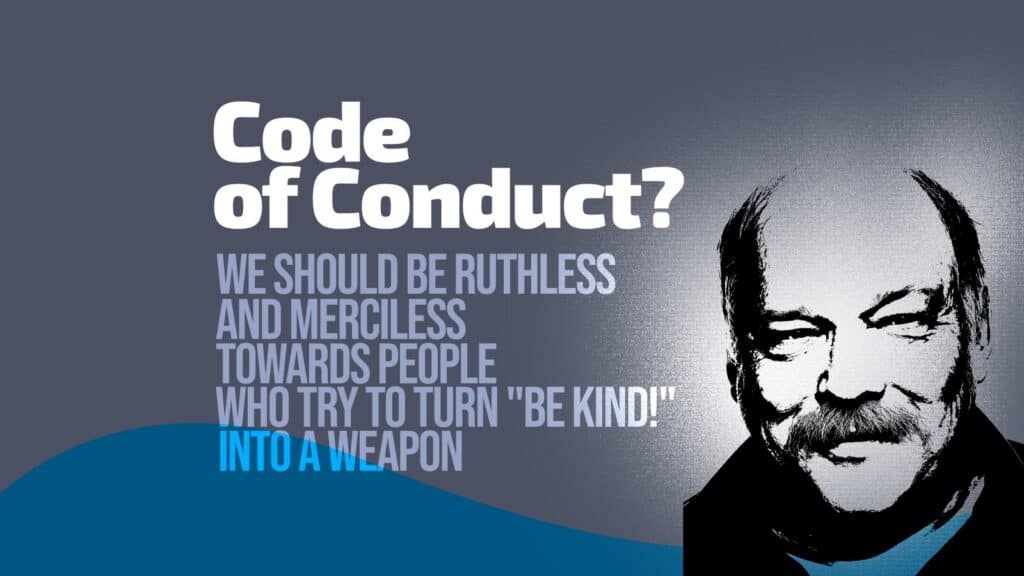Pretty much every job starts the same way: on day one, you’re asked to go over the rules about how we’re expected to treat each other. They’re usually wrapped up in something called a Code of Conduct, which is just a way of setting the moral and ethical boundaries for working with your teammates.
Even though this set of rules is usually mandatory and non-negotiable in almost every company, one of the most well-known voices in the open-source community has come out against applying it to projects driven by communities, sharing, to put it mildly, an unpopular opinion on the subject.
In a recent post on X, Eric S. Raymond (ESR), one of the most influential early figures in the open source movement best known as the author of The Cathedral and the Bazaar, a seminal essay that helped shape the modern open source ethos, directed his authority toward dismantling what many communities have adopted as a standard practice: Codes of Conduct intended to define acceptable behavior among contributors.
Raymond described them as “a kind of infectious social insanity” that has caused “drama, politics, and backbiting” rather than fostering collaboration. According to him, such documents are not only ineffective but counterproductive. He argues that attempts to codify behavior provide control surfaces for manipulation. His advice is blunt:
- Refuse to adopt a Code of Conduct.
- If your project has one, delete it.
- If you’re forced to keep one for bureaucratic reasons, replace it with a single rule: “If you are more annoying to work with than your contributions justify, you’ll be ejected.”
Moreover, Raymond insists that while kindness in interactions should be encouraged, communities must be “ruthless and merciless towards people who try to turn ‘Be kind!’ into a weapon.” In his view, indulging those who use Codes of Conduct as leverage only leads to more conflict.
Well, these are quite bold statements, perhaps even leaning toward the extreme. Whether they are correct or not is ultimately for each individual to judge. While I hold great respect for ESR and his remarkable contributions to the open source movement, in this case, I find myself unable to agree with his position.
As you probably know, even something as fundamental as the Linux kernel has its own Code of Conduct. On the lighter side, however, it’s worth remembering that SQLite once adopted a Code of Ethics based on the Rule of St. Benedict, a 6th-century guide for monastic life. Yes, exactly—a 1,500-year-old document—an unusual choice that has often been cited as both humorous and thought-provoking in open-source circles.
In the end, I’d say yes—there are times when Codes of Conduct get used more as a way to punish or justify controversial decisions. But these are isolated cases. Generally speaking, these rules serve a very noble purpose: to ensure that everyone is treated with fairness and respect. And honestly, that’s something we all want.

I second LS and ESR opinion. Keep politics out of Linux.
He has found a home in X, that’s for sure !
Libertarian, Gun advocate, and so on.
https://en.wikipedia.org/wiki/Eric_S._Raymond#Political_beliefs_and_activism
A very fine man indeed…
Keep politics out of Linux. Code of conduct invites that.
Let’s be honest. Code of conducts are tools from and for totalitarian leftists to randomly decide via double standards who they will ban. If leaning on their political side, anyone can wrongly, loosely and defamatorily call anyone N-word or F-word and not be sanctioned. While if leaning towards the other side, just mentioning some soft words or people or disagreeing with some politics (or just to make things political) will have you banned.
They have turned into a leftist weapon to impose their totalitarian views to everyone. The people instrumentalizing CoCs are politically biased (always on the same side) and malignantly apply them to fit their narrative exclusively. To them, it justifies acting toxic and disrespectful to everyone. That’s all they do these days. Just a scam.